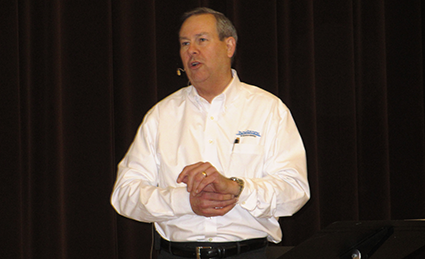
Rich church or poor: which are you?

By Melissa Lauber
UMConnection Staff
Too many United Methodists today still love money more than Jesus. That’s one of the primary reasons they give, on average, only 1 percent of their income to the church. But churches can change that, said giving guru Clif Christopher.
The Mid-Atlantic United Methodist Foundation sponsored the Rev. Christopher to speak to more than 100 local church leaders at Glen Mar UMC Feb. 25. Drawing from his new book, “Rich Church/Poor Church,” Christopher confided to those present that “a failure to articulate our mission and how we’re accomplishing that mission is our greatest failure.” Debt, low expectations and a lack of effective leadership are among the other causes for people failing to give to United Methodist churches.
But the fault is not in the people. Most Americans are giving generously to non-profits, they’re just not giving to your church, Christopher said. Discovering why not takes one into an exploration of what it means to be a rich church. “This is not about big or little budgets. A rich church is a church that is able each day to focus its attention on mission and ministry, while a poor church must focus its attention on getting money.”
Throughout the day-long session, Christopher illuminated the difference between the two types of churches.
Rich churches, said Christopher, focus on their members’ discipleship. Poor churches focus on appeasement and making members happy. Rich churches tell compelling stories of tranformed lives. Poor churches tell about facts and budgets. Rich churches avoid debt. Poor churches work without a financial safety net. Rich churches are comfortable talking about and asking for money. Poor churches want to please people at all costs.
Rich churches model humility; poor churches model arrogance and harbor an expectation that their members “owe them.” Rich churches have high expectations of their members, believing that tithing is a part of discipleship; poor ones don’t. In rich churches pastors know what each member gives and leads from facts. In poor churches they guess about their members’ giving and lead from a sense of hope. Rich churches look at the taking of the offering as a high moment in the worship experience. Poor churches see it as a time out, Christopher said.
His list of differences were summarized with: rich churches look for commitments, poor churches look for contributions. In rich churches, they know that giving changes people; it transforms lives. In poor churches, they give primarily to balance the budget.
In giving, Christopher stressed, there are three chief reasons why people give where they do. First, they believe in the mission, they give where they see success occurring in a mission they value. They want their money to make a difference.
Second, they have regard for the leadership. They know that building and programs don’t change lives, people do. So they give money to people they have developed a relationship with and who they trust.
And third, they give to those they believe are fiscally responsible. People don’t give to sinking ships, Christopher said. They don’t throw their money down the rat-hole of an organization in decline, and that includes churches. No matter how righteous the cause, no one wants to prop up a dying church by giving it all their money. Churches need to share a narrative of hope and of lives transformed by Christ, he said.
This stewardship event with Christopher was sponsored by the Mid-Atlantic United Methodist Foundation, an independent IRS 501(c) non-profit that serves as a financial resource for churches in the Baltimore-Washington, Peninsula-Delaware and Eastern Pennsylvania annual conferences.
In 2013, the foundation, which manages more than $75 million in assets, paid more than $5.5 million directly to its clients’ ministries and provided matching grants of $30,000 in ministry support.
In the Baltimore-Washington Conference, Frank Robert does training, consulting and investing work to help congregations become financially healthy so that they can multiply God’s work in the world. For more information, visit www.midatlanticfoundation.org or contact Robert at 410-309-3475.

Login/Register to leave comment